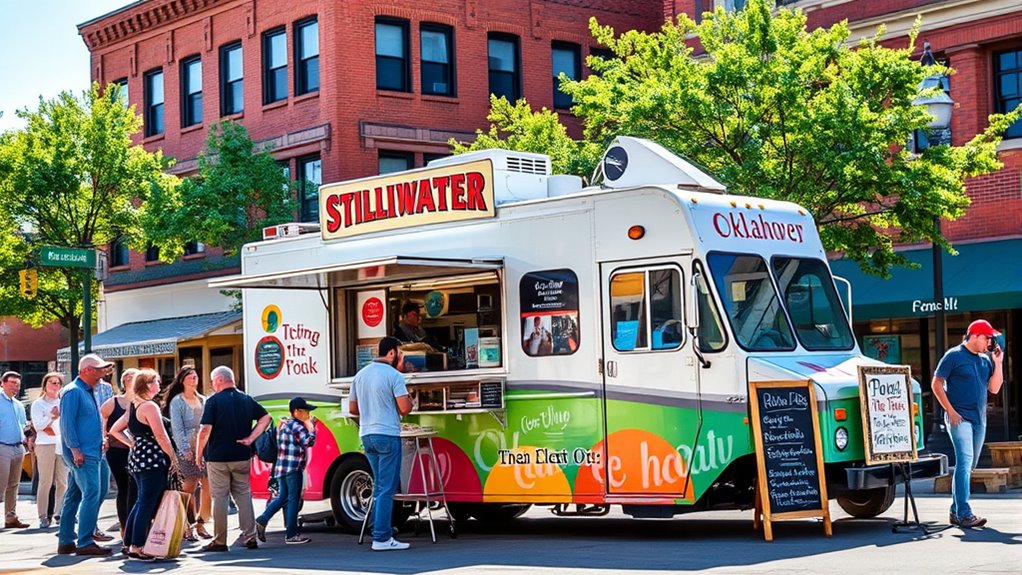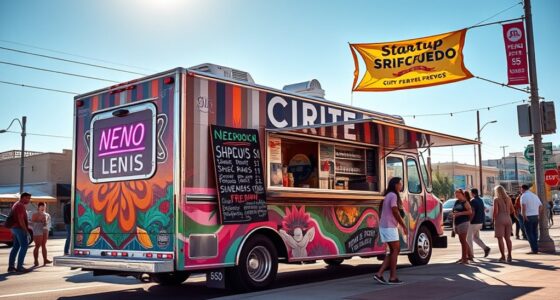To open a food truck in Stillwater, Oklahoma, you need to obtain permits like the Itinerant Merchant License, a sales tax permit, and health licenses, along with location permits for your desired spots. Startup costs typically range from $30,000 to $150,000, covering the vehicle, equipment, and branding. Focus on prime locations near OSU or downtown, craft a appealing menu with local flavors, and develop a strong marketing plan. Continue exploring these details to set yourself up for success.
Key Takeaways
- Obtain necessary permits including the Itinerant Merchant License, Oklahoma Sales Tax Permit, and Food Establishment License before starting operations.
- Budget for truck purchase or leasing, branding, equipment, licensing fees, and ongoing expenses like fuel, maintenance, and insurance.
- Secure prime locations near Oklahoma State University, downtown Stillwater, or during local events, while adhering to parking and distance regulations.
- Develop a menu featuring regional dishes with local ingredients, seasonal specials, and options for vegan/vegetarian customers to attract diverse patrons.
- Promote your food truck via a professional website, active social media, community events, and partnerships to build brand awareness and customer loyalty.
Essential Permits and Licenses for Food Truck Operations in Stillwater
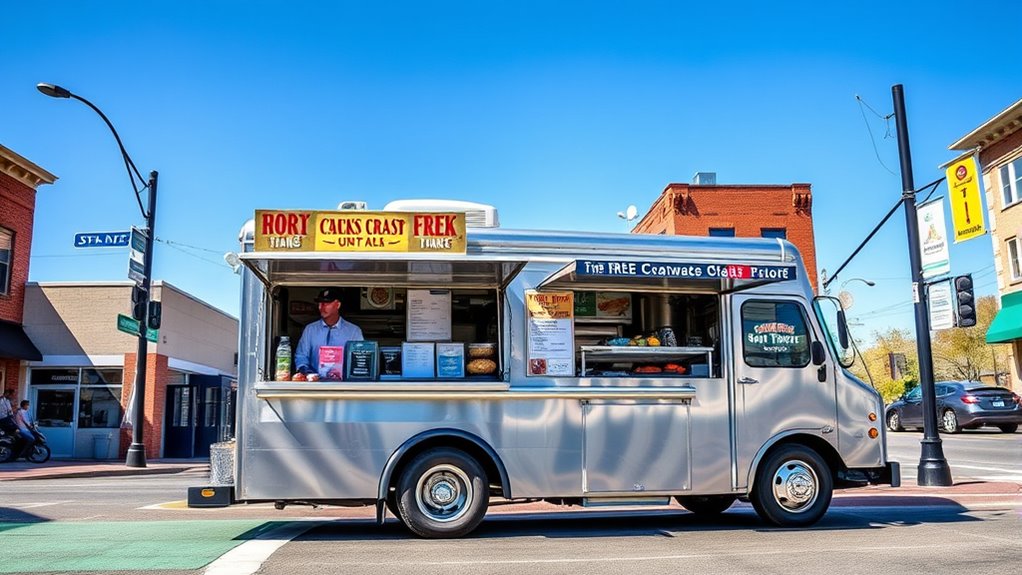
To operate a food truck in Stillwater, you need to obtain several essential permits and licenses. First, you must secure an Itinerant Merchant License from the City Clerk at 723 S. Lewis St. The application costs $50 and is valid for one year unless revoked. You’ll need to complete the Application for Mobile Food Service License and adhere to local ordinances that specify additional regulations. Before starting, you must also obtain an Oklahoma Sales Tax Permit and provide proof of liability insurance, typically around $1,000,000, especially if operating on campuses or institutional settings. Additionally, you must pass health inspections from state and county health departments, which guarantees your food safety standards meet regulatory requirements. Proper licensing ensures compliance with local regulations, avoiding fines and legal issues. Ensuring your equipment and facilities meet health and safety standards is crucial to passing inspections smoothly. Proper documentation and compliance are vital to avoid penalties or license revocation.
Understanding the Cost Breakdown for Launching Your Food Truck
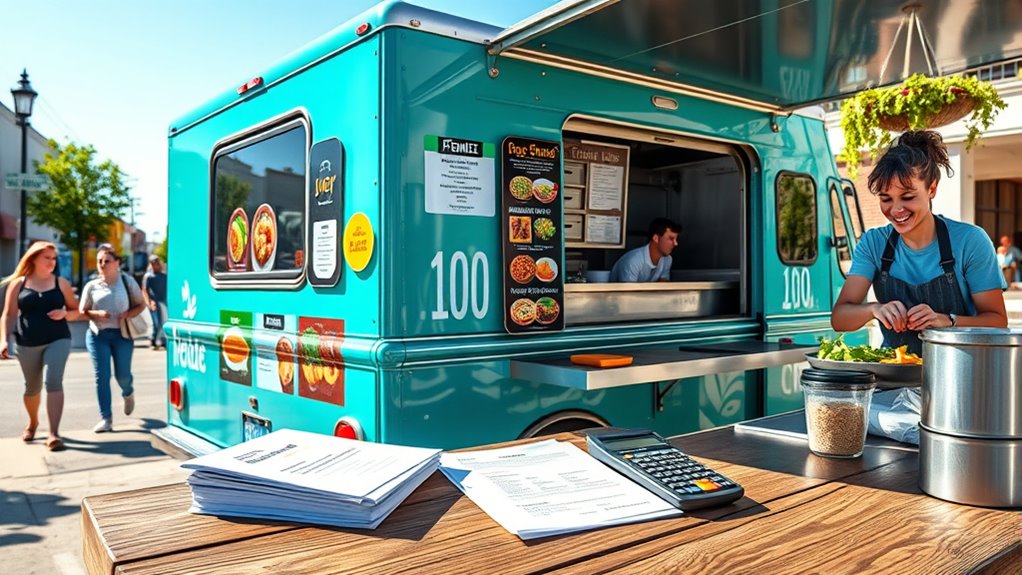
When planning your food truck, it’s essential to understand the costs involved, from licensing and permits to equipment and setup. You’ll also need to budget for ongoing expenses like maintenance and supplies to keep your operation running smoothly. Knowing how these costs fit together helps guarantee your startup stays financially sustainable. Incorporating cost-effective glycolic acid products into your skincare routine can also enhance your overall appearance, attracting more customers to your food truck business.
Licensing and Permit Fees
Understanding the licensing and permit fees involved in launching your food truck is essential for budgeting accurately. These costs vary at the state and local levels and can add up quickly. You’ll need a Food Establishment License ($425), a Food Handler Permit ($6–$30), and a Food Service Operator’s Certificate ($50/year). A Sales Tax Permit ($20) is also necessary. For mobile operations, vehicle licenses range from $100 to $250, depending on the number of events. Stillwater requires an Itinerant Merchant License ($50), while other cities have additional mobile vehicle fees. Recent legislation may soon introduce a statewide license to streamline costs. Be prepared for application fees, renewal costs, and possible extra permits per employee or event.
- Statewide food truck license proposal
- Local mobile vehicle licenses ($60–$155)
- Food Establishment and handler permits
- Event-specific temporary permits ($20–$50)
- Application and renewal fees
Equipment and Setup Costs
Launching a food truck involves a significant investment in equipment and setup costs that can vary widely based on your choices. New trucks typically cost between $75,000 and $150,000, depending on size and customization, while used vehicles range from $30,000 to $80,000, often requiring refurbishing. Branding wraps add $2,500 to $5,000, essential for visibility. Kitchen equipment such as grills, fryers, and ovens can total $4,000 to $9,000, with refrigeration and prep stations adding another $3,000 to $8,000. Safety and hygiene gear, including sinks and fire suppression systems, can cost $3,000 to $6,500. Power sources like generators range from $3,000 to $10,000, and POS systems add $1,000 to $3,000. These costs form the foundation of your food truck setup. Proper planning and budgeting can help prevent unexpected expenses and ensure a smooth launch process. Additionally, understanding equipment costs and other essential expenses can improve your overall financial planning.
Operating and Maintenance Expenses
Operating and maintenance expenses are ongoing costs that can substantially impact your food truck’s profitability. These include essential costs like fuel, regular vehicle maintenance, and repairs, which can add up annually. Insurance is also a significant expense, covering liability, vehicle, and worker’s compensation, often costing several thousand dollars each year. Additionally, safety equipment such as fire suppression systems and first aid supplies require periodic updates and upkeep. Food and consumable supplies form a major variable expense, with startup costs around $2,000–$3,000 and recurring costs for ingredients, disposables, and packaging. Managing food waste and spoilage impacts your efficiency and profit margins. Proper budgeting for these ongoing expenses ensures your food truck runs smoothly and remains profitable. Regularly reviewing your effectiveness of eye patches can also inspire maintenance routines that keep your vehicle and equipment in top condition.
Locating Your Food Truck: Regulations and Prime Spots in Stillwater
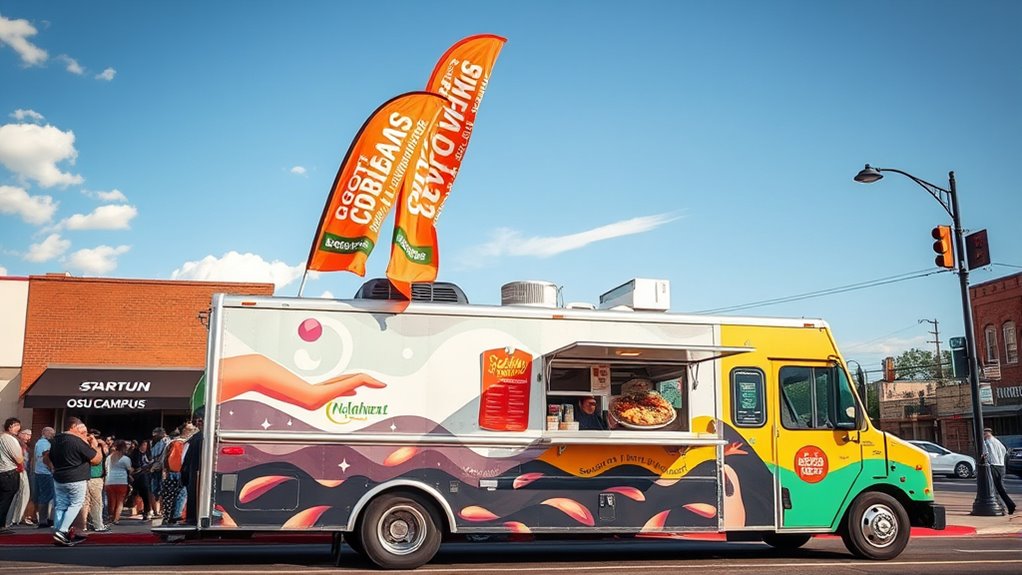
Finding the right spot for your food truck in Stillwater involves steering through specific regulations and choosing high-traffic areas. You’ll need an Itinerant Merchant license, which costs $50 annually, and a Sales Tax Permit to operate legally. Food trucks can’t stay in one place more than 12 hours and must maintain at least 10 feet distance from buildings and other trucks to meet safety codes. You can’t block fire lanes, hydrants, or sidewalks, and must ensure proper clearance from structures. Location permits are required for certain areas, Prime locations include downtown Stillwater, near Oklahoma State University, and at public events, where foot traffic is high. Securing permission for private parking lots or farmers markets can expand your options. Always coordinate with city officials and event organizers to optimize your placement and stay compliant. Additionally, understanding local regulations will help you avoid fines and ensure smooth operations.
Crafting a Menu That Complies and Appeals to Local Tastes
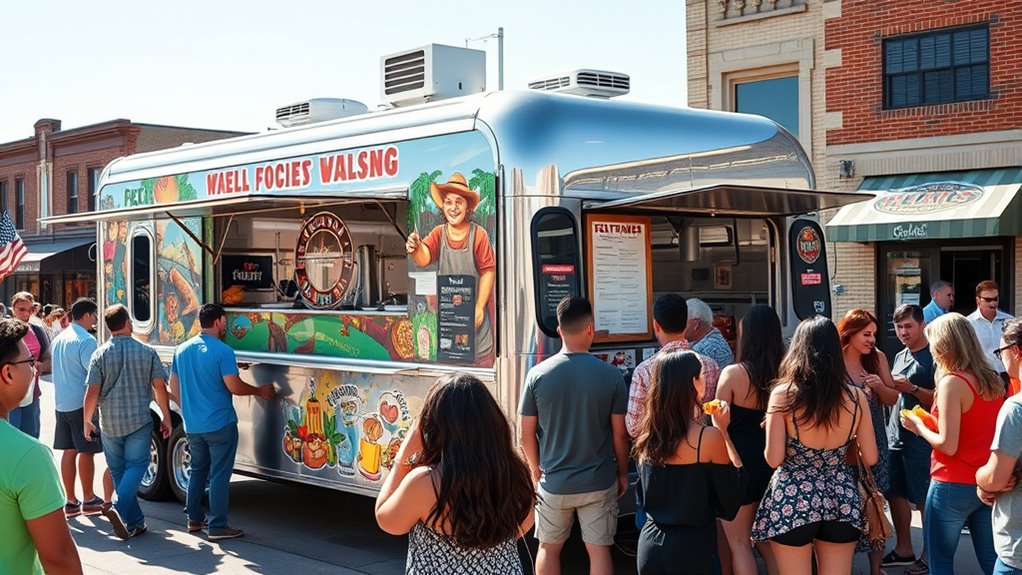
To create a menu that both complies with Oklahoma food safety regulations and appeals to Stillwater’s diverse local tastes, you need to balance regulatory requirements with customer preferences. Focus on offering popular regional dishes like Southern BBQ, Tex-Mex, and American comfort foods, incorporating seasonal, locally sourced ingredients to attract health-conscious customers. Including vegan or vegetarian options broadens your appeal to students and residents. Consider adding unique twists on traditional Oklahoma dishes to stand out. Ensure all menu items are prepared in approved facilities, follow sanitation standards, and include proper labeling. Keep the menu simple, emphasizing signature dishes for consistency and quick prep. Regularly update it with seasonal specials and gather feedback to stay aligned with local tastes. Additionally, highlighting local ingredients and Oklahoma traditions can strengthen your menu’s appeal and authenticity.
Strategies for Effective Marketing and Building a Customer Base
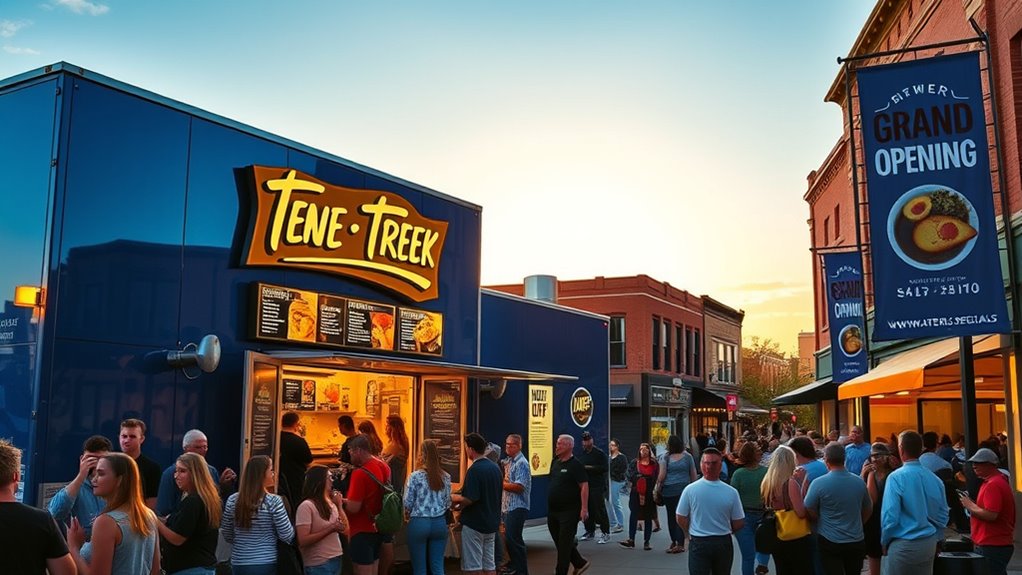
How can your food truck stand out in a busy Stillwater market? Focus on creating a strong, consistent brand identity with a memorable logo, color scheme, and messaging that reflects your personality. Share your unique story—why you started and what makes your offerings special—to foster loyalty. Use storytelling across social media, menus, and packaging to connect emotionally with customers. Leverage online marketing by building a professional website optimized for local SEO and engaging actively on social media with high-quality photos, contests, and updates. Cultivate an email list for newsletters and use loyalty programs to reward repeat customers. Participate in local events, partner with nearby businesses, and promote through flyers and reviews. Understanding Your Market will help you tailor your offerings and marketing efforts to the preferences of Stillwater’s residents and visitors. Additionally, implementing cookie management strategies can improve your website’s user experience and ensure compliance with privacy regulations. These strategies will help attract and retain a loyal customer base.
Ensuring Health and Safety Compliance Throughout Your Business
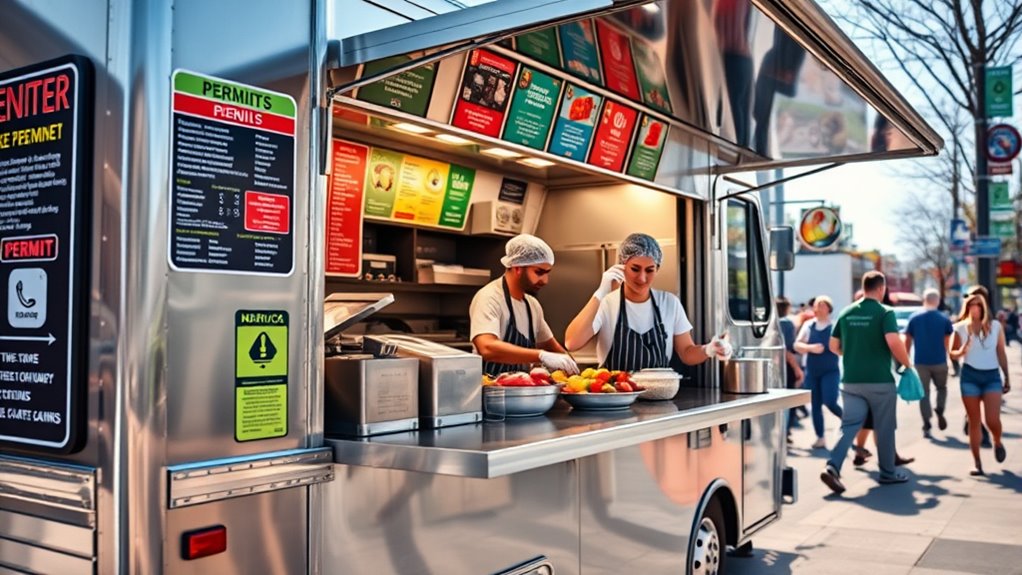
Maintaining health and safety standards is the backbone of running a reputable food truck business in Stillwater. You must comply with Oklahoma’s statewide regulations, including vehicle cleanliness, proper licensing, and notifying health authorities for mass gatherings. Guarantee your truck has weather-resistant exteriors, smooth interior surfaces, and clean, pest-free equipment. Regularly sanitize food prep areas, maintain proper water and waste disposal, and submit sanitation plans for approval. Proper temperature control is essential—monitor and calibrate holding equipment, and train staff on hygiene practices like handwashing. Use a licensed commissary for cleaning and storage. Be prepared for routine health inspections, and always seek pre-approval for operational changes. Staying compliant safeguards your reputation and protects your customers’ health. Additionally, Mobile food vendors in Oklahoma are required to obtain annual licenses and adhere to construction, safety, and operational guidelines to ensure compliance and safety. Incorporating comprehensive safety protocols can further enhance your business’s credibility and customer trust.
Frequently Asked Questions
How Long Does the Permit Approval Process Typically Take in Stillwater?
You’re wondering how long the permit approval process takes in Stillwater. Based on local ordinances, once you submit a complete application with all required documents, the permit can be issued immediately if everything meets safety and health standards. Delays only happen if your application is incomplete or if inspections or health approvals take extra time. Typically, you can expect your permit within the same day or a few business days at most.
Are There Specific Zoning Restrictions for Food Trucks Near Oklahoma State University?
You might feel the landscape is open, but zoning restrictions near OSU are like hidden fences guiding your path. Stillwater’s rules focus on fire safety and spacing rather than strict bans, so while there’s room to operate, you must respect clearance zones and safety guidelines. Keep in mind, permits and licenses are your keys to accessing this terrain, ensuring your food truck can roll smoothly through the campus and beyond.
Can I Operate a Food Truck at Multiple Locations Simultaneously?
You can’t operate a food truck at multiple locations simultaneously with the same vehicle, as regulations limit serving to one spot at a time. To cover multiple sites, you’ll need separate licenses for each truck and guarantee compliance at each location. Plan your schedules carefully, get all necessary permits beforehand, and coordinate with local authorities. This way, you avoid penalties and stay within legal boundaries while expanding your food truck business.
What Are the Common Health Inspection Issues Faced by New Food Trucks?
Imagine your food truck as a busy ship steering through health rules. Common issues you’ll face include temperature control violations, like keeping raw meats above ready-to-eat foods, risking contamination. You might struggle with hygiene, such as inadequate handwashing stations. Storage challenges lead to cross-contamination, and some overlook certification requirements. Staying vigilant, monitoring temps, enforcing hygiene, and ensuring proper storage can help your vessel sail smoothly through inspections.
Are There Any Grants or Financial Assistance Programs Available for Food Truck Startups?
You’ll find several grants and financial assistance options for food truck startups. Oklahoma City offers the $8,000 OKC Food Truck Business Accelerator Grant, supporting growth with coaching and equipment upgrades. Additionally, minority-focused programs like StitchCrew and OKC’s Minority Founder Micro-Accelerator provide grants up to $20,000 after completing their programs. While federal grants like USDA’s Rural Business Development Grants are available, they often require partnerships with local entities.
Conclusion
Starting your food truck in Stillwater is like planting a seed—nurture it with permits, costs, prime spots, and great food, and watch it grow. Stay compliant, market smart, and craft a menu that delights. Remember, every successful journey begins with a single step, but it’s your passion that fuels the ride. So, are you ready to turn your culinary dreams into Stillwater’s next favorite spot? The road’s waiting—take the wheel.
